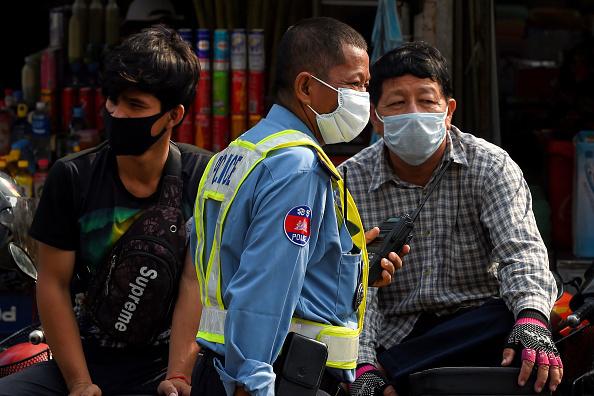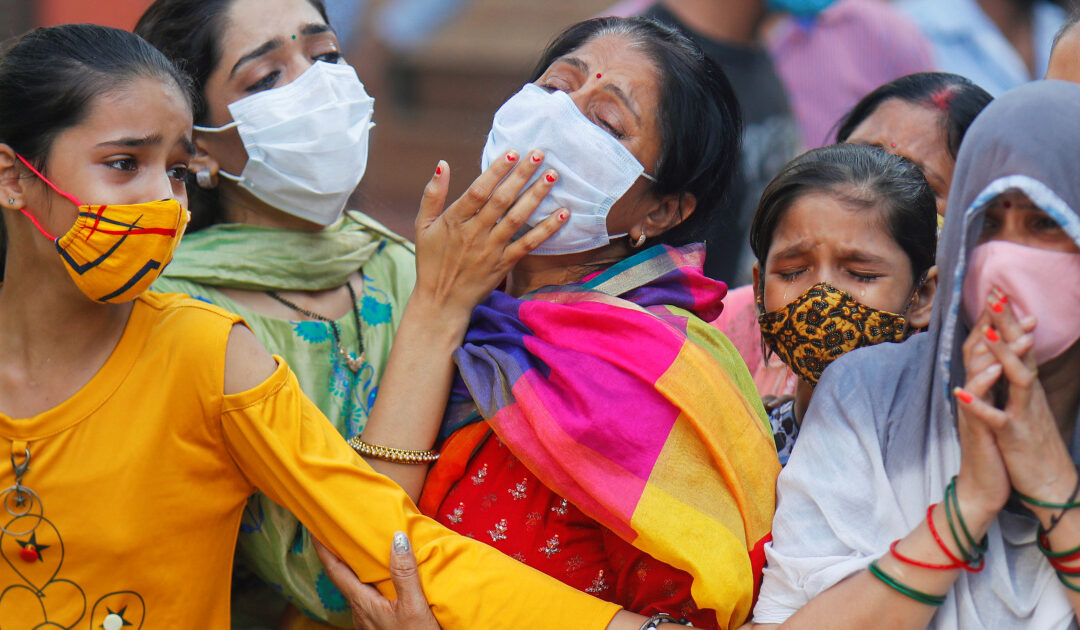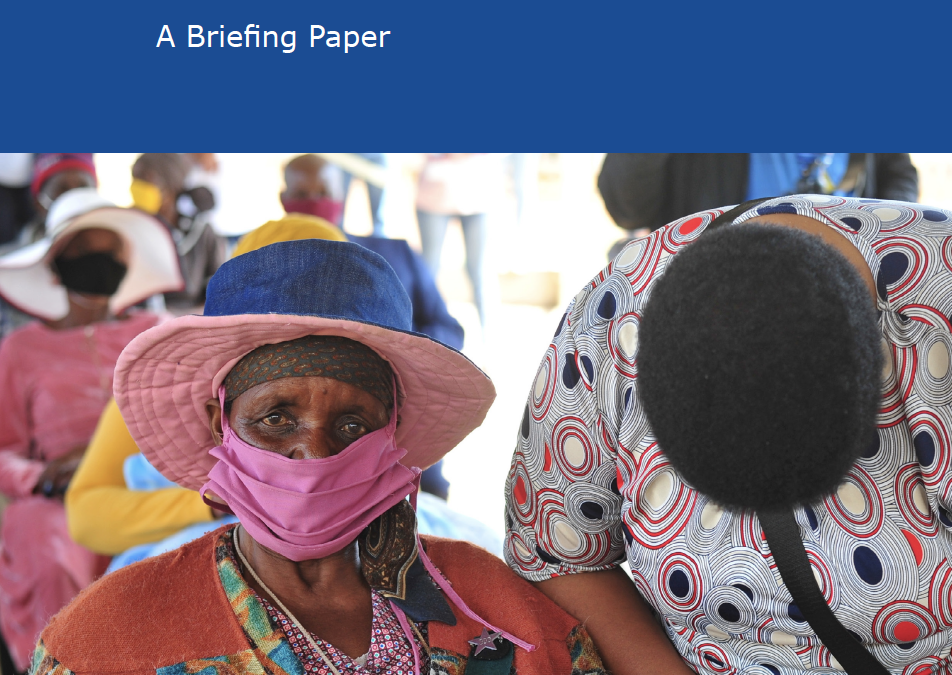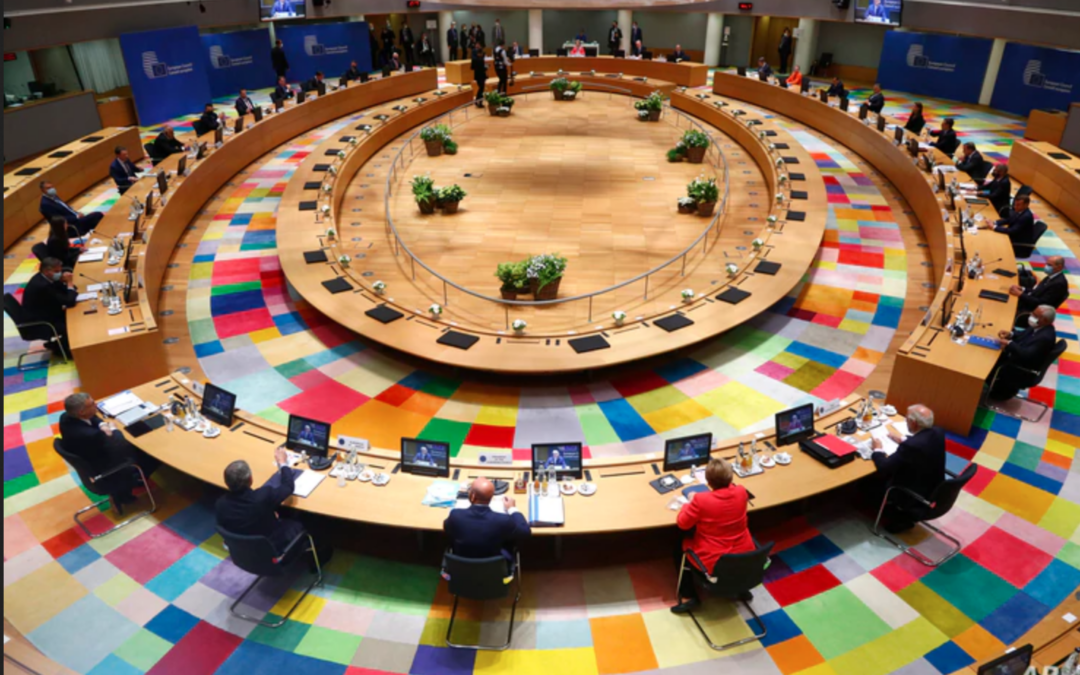
Jun 21, 2021 | Advocacy, Non-legal submissions
The ICJ and Human Rights Watch today addressed the UN Human Rights Council in the Interactive Dialogue on the Report of the Office of the High Commissioner for Human Rights on COVID-19 responses and human rights.
The statement reads as follows:
Madam High Commissioner,
The ICJ and Human Rights Watch welcome your report on COVID-19 and human rights.
We believe that urgent action is needed beyond broad statements of condemnation of vaccine inequity. People without access to vaccines continue to live in fear of COVID-19 and, throughout the world, many continue to die.
Slow vaccine rollout continues across Southern Africa and Latin America and in Nepal and India despite the prevalence of quickly transmitting variants. In the face of such significant peril, Indian courts have questioned the rationality of government plans. In South Africa elite athletes and sports administrators have been vaccinated, while older persons and vulnerable populations continue to wait their turn.
Pharmaceutical companies impose far reaching non-disclosure agreements on governments which restrict access to health information necessary to combat corruption and ensure accountability. In Colombia, courts have ordered disclosure of contracts relating to COVID-19 vaccines despite such agreements.
COVID-19 response measures continue to be used in Cambodia, Thailand and Vietnam to restrict access to health information and stifle expression of human rights defenders. In Hungary similar tactics have been compounded by simultaneous attacks on judicial independence.
How will the OHCHR guide States on how to ensure effective judicial and other remedies are available for those whose human rights are threatened by inadequate or inequitable COVID-19 responses?
I thank you.”
Contact:Massimo Frigo, ICJ UN Representative, e: massimo.frigo(a)icj.org, t: +41797499949

May 25, 2021 | News
The ICJ joined other international human rights organisations to call on the Cambodian government to immediately stop its assault on freedom of expression in the context of the COVID-19 pandemic.
In recent months, the government has warned against public criticism of its actions, prevented independent journalists from reporting on the pandemic, prosecuted individuals for criticising the inoculation campaign, and threatened journalists and social media users with legal actions on the spurious grounds of provoking “turmoil in society.
While Cambodia was spared from high numbers of severe COVID-19 cases in 2020, beginning in February 2021 there has been a spike in cases to which the government responded with disproportionate and unnecessary measures in violation of Cambodia’s international human rights obligations. This includes a campaign against freedom of expression that further constricts media freedom and promotes fear and self-censorship in the country. These measures serve to undermine, not advance, efforts to stop the spread of COVID-19.
The Cambodian authorities placed a de facto ban on independent reporting in Phnom Penh’s red zones—areas deemed to be high risk for COVID-19 transmission. On 3 May 2021, the Ministry of Information announced that only state media or journalists invited by the government would be permitted to report from red zones. The next day, the Ministry of Information issued a letter warning journalists not to disseminate information that could “provoke turmoil in society” and threatening legal action against those who disobey. The letter followed viral livestream footage from multiple Facebook news outlets of long queues of COVID-19 patients outside government treatment centres.
The government’s campaign to silence critical commentary has extended beyond journalists to ordinary people, in a manner incompatible with international human rights standards.
In a press release dated 1 May 2021, the Government Spokesperson Unit demanded the immediate cessation of social media posts intended to “provoke and create chaos” in the context of the COVID-19 pandemic, referring to such posts as “acts of attack” that must be punished. The press release concluded by praising the efforts of government officials to curb the spread of COVID-19 but did not provide any legal justification for imposing these possible restrictions on the right to freedom of expression.
On 30 April 2021, Kandal provincial authorities warned farmers in Sa’ang district not to post images of vegetables spoiling in their fields due to the closure of markets, stating that such communications are bad for morale. One farmer, Tai Song, was pressured by the provincial authorities to sign a document agreeing not to post such content again after he shared a photo on Facebook showing his vegetables rotting and stating that he had to clear and throw away his crops.
The Cambodian authorities have arrested dozens of individuals for expressing critical opinions about the government’s COVID-19 response, including at least six individuals for their criticism of the government’s vaccination campaign. One Chinese journalist, Shen Kaidong, was subsequently deported for publishing a story deemed ‘fake news’ in which multiple Chinese nationals reported receiving a text offering them the Sinopharm vaccine for a service fee.
Authorities have also prosecuted at least three individuals—Korng Sambath, Nov Kloem, and Pann Sophy—for posting TikTok videos criticising the use of Chinese-made vaccines under the new, overly broad and vague Law on Measures to Prevent the Spread of COVID-19 and other Serious, Dangerous and Contagious Diseases (the COVID-19 Law).
These actions are consistent with the government’s systematic and relentless crackdown on freedom of expression and information spanning far beyond the beginning of the COVID-19 pandemic. This latest surge contributes to the government’s broader efforts to silence all critical voices in Cambodia.
The right to freedom of expression is protected by Article 19 of the International Covenant on Civil and Political Rights, to which Cambodia acceded in 1992, and by Article 41 of Cambodia’s Constitution.
Protecting public health is the grounds on which the government is purporting to restrict freedom of expression. While there is a legitimate need to counter the spread of misinformation online to protect public health during a pandemic, this objective must be provided by a clear and accessible law and pursued using the least intrusive means, rather than unnecessary and disproportionate measures like unwarranted arrests, detentions, and criminal prosecutions.
In its General Comment 34, the UN Human Rights Committee emphasised the essential role of the media in informing the public and stated that “in circumstances of public debate concerning public figures … the value placed [on] uninhibited expression is particularly high.” A 2017 Joint Declaration of four independent experts on freedom of expression stressed that “general prohibitions on the dissemination of information based on vague and ambiguous ideas” are incompatible with international human rights standards.
Download
To read the full statement with a list of co-signatories, click here.

May 7, 2021 | News
As the European Union and India prepare for a meeting of their leaders on 8 May they should jointly commit to a strategy for protecting all people in India from the devastating second wave of the Covid-19 pandemic now ravaging the country, said the ICJ today.
India has faced unprecedented impact from the pandemic since 15 April, with some 400,000 daily cases and a daily death toll now officially around 4,000 and likely even higher. India’s healthcare system and infrastructure has strained to meet the needs of people for oxygen, medicines, testing, hospital beds, ambulances, and doctors. India, a vaccine-production powerhouse globally, has only vaccinated just over two percent of its population and is now facing severe shortage of vaccines.
“The scenes emerging from India are horrifying but unfortunately not unexpected. This global pandemic demands global cooperation and national competence and this is the moment for the EU and India to demonstrate cooperation and competence. The Indian government was lecturing the world about its performance instead of preparing for the predictable resurgence of the pandemic, and now it is busy silencing people demanding help or criticizing the government’s poor performance,” said Sam Zarifi, ICJ’s Secretary-General.
The ICJ added that the performance of the EU and its Member States in international cooperation to tackle COVID globally left much to be desired, particularly as they have resisted supporting a loosening of intellectual property restrictions that have hampered efforts at wider vaccine production and distribution.
“At the same time, the proposal by India and South Africa for removing global patent restrictions for vaccine protection was rejected by some of the wealthiest governments, including the EU, who seem more focused on economic interests rather than global responses to a global pandemic,” said Zarifi.
The EU has already agreed to assistance to India through its Civil Protection Mechanism and individual EU countries have delivered some needed supplies and vaccines.
“The EU and Member States should increase aid efforts to India and immediately reverse their opposition to waiving intellectual property restrictions to vaccine production under the World Trade Organization TRIPS agreement, especially now that the United States has indicated it would end its obstructionism. The EU should not be on the wrong side of history as the last obstacle to global vaccine production,” Zarifi said.
The ICJ also urged the EU to remind the Indian government of its obligations under international law and guarantees of the Indian Constitution to protect the rights of people in India to life and to health.
“The summit between the European Union and India brings together powerful States who should use this opportunity to align their actions at the global, regional, and national levels to protect people from the pandemic,” said Zarifi. “International law provides the framework for cooperation and both the EU and India must do a better job of complying with their international legal obligations.”
Additional Information
India’s judiciary has at various levels has severely criticized the Indian Central and State governments and issued orders for urgent remedial responses.
In particular, the Indian Supreme Court has ordered the central government to:
- ensure adequate supply of oxygen through provision of emergency buffer stock by the central government in collaboration with state governments;
- develop a national policy on admission to hospitals and in the interim ensure that no patient is denied access to hospitals or essential drugs; and
- recognize vaccines as a “valuable public good”.
The Supreme Court has also questioned the constitutionality of India’s vaccine policy due to differential pricing for state governments, the central government and private hospitals, stating that the government needs to revisit the policy so that it “withstands the scrutiny of Articles 14[right to equality] and Article 21[right to life] of the Constitution”.
Additionally, the Supreme Court has suggested that the Central Government take steps to ensure access to essential drugs as well as to enhance its healthcare workforce as needed, in line with India’s constitution and its international legal obligations.
As party to the International Covenant of Economic, Social and Cultural Rights, India is required to take all necessary measures to ensure the “prevention, treatment and control of epidemic” and to create conditions “which would assure to all medical service and medical attention in the event of sickness”. Further, these obligations, as stressed by the UN Committee on Economic, Social and Cultural Rights entail removing any discrimination in vaccine access; guaranteeing affordability and economic accessibility of vaccines for all people; prioritizing physical accessibility to vaccines, especially for marginalized groups and people living in remote areas; and guaranteeing access to relevant health information.
Additional Reading
EU: prioritize rights at India Summit, provide essential medical supplies, urge India to free rights defenders, address abuses – ICJ Press Release, 3 May 2021
Indian Government Fails to Protect Right to Life and Health in Second Wave of COVID-19 Pandemic – ICJ Press Release, 29 April 2021
Contact
Osama Motiwala, ICJ Asia-Pacific Communications Officer, t: +66-62-702-6369; e: osama.motiwala(a)icj.org

May 6, 2021 | News, Publications, Reports
Southern African States have individually and collectively failed to provide sufficient and equitable COVID-19 vaccine access to meet their human rights obligations, the ICJ said today in a new briefing paper entitled The Unvaccinated: Equality not Charity in Southern Africa.
The paper focuses on the impact of COVID-19 on countries of the Southern African Development Community (SADC), a regional economic community comprising 16 Southern African countries whose goal is to enhance the standard and quality of life of the peoples in the region.
The publication considers SADC and its Member States’ collective failure to ensure access to COVID-19 vaccines despite more than 63,000 lives lost to the virus and countless others’ lives and livelihoods affected in the region.
This is due to a multitude of reasons, some common amongst the countries and others unique to individual Member States. While Tanzania and Madagascar denied the existence of the virus and rejected COVID-19 vaccines respectively, other countries with relatively greater resources, such as South Africa, failed to mobilize their resources adequately and equitably.
“COVID-19 is a global pandemic, but its impact was aggravated in southern Africa by the failure of governments to prepare and respond, individually or through SADC,” said Tim Fish Hodgson, ICJ’s Legal adviser on Economic, Social and Cultural Rights, in Johannesburg.
Combatting deadly communicable diseases like COVID-19 is one of the founding objectives under SADC’s founding treaty, and is also accounted for under the SADC Health Protocol. Yet, SADC has failed to provide almost any concrete guidance or coordinating role in regional procurement of COVID-19 vaccines since October 2020, prior to the availability of COVID-19 vaccines. While SADC’s chair, President Filipe Nyusi of Mozambique has encouraged a regional pooling of resources to facilitate procurement of necessary vaccines and distribution in a statement in January 2021, SADC has since taken no clear action towards this goal.
“While powerful global actors have erected roadblocks to equitable vaccine access in southern Africa, this should not conceal the burning need for SADC States to take essential measures to mobilize their collective resources towards efficient and equitable vaccine acquisition, allocation and distribution. As our research shows, they have failed to do so and SADC has been conspicuously silent,” Hodgson said.
These dire circumstances have led Fatima Hassan, South African human rights defender and director of the Health Justice Initiative, to observe that “philanthropy [and] benevolence cannot fund equality” in vaccine access. Indeed, the donation of vaccine doses through COVAX and other measures are not enough, and without rapid and adequate action to ensure equitable access to COVID-19 vaccines, it might be too late.
The ICJ’s research at a global and regional level have emphasized the urgent need for international institutions like the World Trade Organization and wealthier States to help countries to manufacture or otherwise acquire and distribute vaccines at affordable prices unimpeded by rigid intellectual property rights restrictions.
“All States should urgently heed the proposal by South Africa and India before the WTO for a waiver of the TRIPS intellectual property rules to allow faster, wider, and better distribution of COVID-19 vaccines,” Hodgson said.
“It is encouraging to see the United States end their opposition to the TRIPS waiver, and we hope that other States, in the European Union, Switzerland, Norway, and Brazil, will end their opposition and recognize that until everyone is safe, no one is truly safe.”
The ICJ emphasized that efforts by SADC and Southern African States is essential alongside ramped up global action.
“The pandemic is raging around the world even though a few countries, mostly the wealthiest, are now able to look beyond the worst of it. Most countries in Southern Africa remain unvaccinated, and in fact we are looking at new devastating waves of the illness. SADC should immediately improve efforts at collaboration and coordination to ensure compliance with their human rights obligation to provide everyone in the region with vaccine access as soon as possible,” Hodgson added.
The ICJ makes recommendations to specific States including Malawi, Tanzania, Madagascar, Zimbabwe and South Africa as well as a range of general recommendations to the SADC, including:
- The SADC Secretariat should urgently and actively facilitate and advance sub-regional COVID-19 vaccine procurement and distribution between the Member States.
- The SADC Secretariat should provide clear guidance to Member States on their human rights obligations pertaining to vaccine access. They should take effective action to address the failure of Member States to act according to their obligations under international law, including under regional agreements.
- All SADC member States should, as a matter of priority, develop, publish and publicize national vaccine acquisition and rollout plans and procurement strategies, detailing concrete measures to ensure non-discriminatory access to vaccines to all people.
Contact
Timothy Fish Hodgson, Legal Adviser on Economic, Social and Cultural Rights, timothy.hodgson(a)icj.org
Tanveer Jeewa, Legal and Communications Officer, tanveer.jeewa(a)icj.org
Download
Africa-The Unvaccinated-Publications-Reports-2021-ENG (full report, in PDF)

May 3, 2021 | News
European leaders at the May 8, 2021 summit with their Indian counterparts should prioritize the deteriorating human rights situation in India, including the right to health, the ICJ and seven other organizations said today.
With a devastating Covid-19 crisis affecting the country, Europe should focus on providing support to help India deal with the acute shortage of medical supplies and access to vaccines. At the same time, European leaders should press the Indian government to reverse its abusive and discriminatory policies and immediately release all human rights defenders and other critics who have been jailed for peacefully exercising their rights to freedom of expression and peaceful assembly.
The organizations are Amnesty International, Christian Solidarity Worldwide (CSW), Front Line Defenders (FLD), Human Rights Watch, the International Commission of Jurists (ICJ), International Dalit Solidarity Network (IDSN, International Federation for Human Rights (FIDH), and World Organisation Against Torture (OMCT).
India has the fastest-growing number of Covid-19 cases in the world and is facing severe healthcare shortages – of testing capacity, medicines, ambulance services, hospital beds, oxygen support, and vaccines. The European Union and its member states should reconsider and reverse their opposition to India and South Africa’s proposal before the World Trade Organization to temporarily waive certain intellectual property rules under the TRIPS Agreement to facilitate increased manufacturing and production of vaccines and related products globally, until widespread vaccination is in place the world over.
The Covid-19 crisis has also highlighted growing human rights concerns in India.. Faced with widespread criticism of its handling of the pandemic, the Indian government has tried to censor free speech, including by ordering social media content taken down and criminalizing calls for help. The government has also ignored calls from the United Nations Office of the High Commissioner for Human Rights for countries to release “every person detained without sufficient legal basis, including political prisoners, and those detained for critical, dissenting views” to prevent the growing rates of infection everywhere, including in closed facilities such as prisons and detention centers.
Instead, the Hindu nationalist Bharatiya Janata Party (BJP)-led government has increasingly harassed, intimidated and arbitrarily arrested human rights defenders, journalists, peaceful protesters, and other critics, including under draconian sedition and counterterrorism laws.
The authorities have jailed a number of human rights defenders, student activists, academics, opposition leaders, and critics, blaming them for the communal violence in February 2020 in Delhi as well as caste-based violence in Bhima Koregaon in Maharashtra state in January 2018. In both cases, BJP supporters were implicated in the violence. Police investigations in these cases were biased and aimed at silencing dissent and deterring future protests against government policies, the groups said.
The government uses foreign funding laws and other regulations to crack down on civil society. Recent amendments to the Foreign Contributions Regulations Act (FCRA) added onerous governmental oversight, additional regulations and certification processes, and operational requirements, which adversely affect civil society groups, and effectively restrict access to foreign funding for small nongovernmental organizations. In September 2020, Amnesty International India was forced to halt its work in the country after the Indian government froze its bank accounts in reprisal for the organization’s human rights work, and many other local rights groups struggle to continue doing their work.
The Indian authorities have also enacted discriminatory laws and policies against minorities. Muslim and Dalit communities face growing attacks, while authorities fail to take action against BJP leaders who vilify minority communities, and against BJP supporters who engage in violence. The Indian government has imposed harsh and discriminatory restrictions on Muslim-majority areas in Jammu and Kashmir since revoking the state’s constitutional status in August 2019 and splitting it into two federally governed territories.
The authorities carried out counterterrorism raids in October on multiple nongovernmental organizations in Kashmir and Delhi, and a newspaper office in Srinagar to silence them, causing a chilling effect on human rights defenders who fear for their safety.
Yet, despite the considerable deterioration in the country’s human rights record under Prime Minister Narendra Modi, the Indian government has effectively shielded itself from the international scrutiny and reactions that the seriousness of the situation should have warranted. Focusing on strengthening trade and economic ties with India, the European Union and its member states have been reluctant to formulate public expressions of concern on human rights in India, with the exception of occasional statements focused solely on the death penalty.
To read the full statement, click here.
Contact:
Sam Zarifi, ICJ’s Secretary General, t: +66 627026369, e: sam.zarifi(a)icj.org









